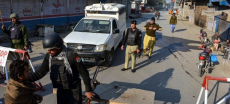[vc_row][vc_column][vc_column_text dp_text_size=”size-4″]
Amidst the recent outbreak of clashes triggered by the inauguration of a controversial Hindu temple in India, Pakistan has made an earnest plea to the United Nations (UN) for intervention in safeguarding Islamic sites within the country. The call for UN involvement was voiced by Pakistan’s UN envoy, Munir Akram, during an ambassadorial meeting of the Organization of Islamic Cooperation (OIC) at the UN headquarters in New York. In this meeting, Akram expressed strong condemnation of the establishment of the Ram Temple on the site where the Babri Masjid once stood.
In an official letter directed to Miguel Angel Moratinos, a senior official for the UN Alliance of Civilisations, Akram underscored the severe implications of the construction and consecration of the Ram Temple in Ayodhya, India. He emphasized that this development poses a grave threat not only to the social, economic, and political well-being of Indian Muslims but also to regional harmony and peace.
Read more: Kashmiris Mark Indias Republic Day As Black Day
The urgency of Pakistan’s appeal to the UN stems from specific incidents in Mumbai, where local authorities took actions that heightened tensions. In India’s financial hub, Mumbai, several makeshift shopfronts owned by Muslims were dismantled, leading to minor clashes in various parts of the city. One incident involved Hindu groups chanting religious slogans as they passed through a Muslim neighborhood on the city’s outskirts. While there were no reports of serious injuries, by Tuesday, authorities had employed excavators to demolish over a dozen shopfronts owned by Muslims in that area.
Furthermore, an additional 40 shopfronts were torn down on Mohammed Ali Road the following day. This street, a significant downtown area and a hub of local Muslim commerce, had witnessed clashes over the weekend. The clashes and subsequent demolitions occurred as part of what municipal officials claimed to be a “routine” clearance drive planned prior to the Sunday clashes. The intended purpose was to remove unauthorized encroachments and facilitate pedestrian movement.
It’s noteworthy that traders of various religions commonly utilize makeshift shopfronts made of canvas and wood to shield their businesses and customers from Mumbai’s harsh weather conditions. However, the recent clearance drive took on a controversial dimension due to its proximity to the clashes and the predominantly Muslim-owned establishments affected.
Local media reports indicated that at least 13 individuals were arrested for their involvement in the weekend clashes, further underscoring the tensions surrounding the events in Mumbai. The plea to the UN by Pakistan underscores the gravity of the situation, highlighting the interconnectedness of religious, social, and political factors and the potential repercussions for not only Indian Muslims but also the broader regional landscape. The UN’s response to this appeal will likely play a significant role in shaping the international discourse around religious freedom and communal harmony in the region.
[/vc_column_text][/vc_column][/vc_row]











